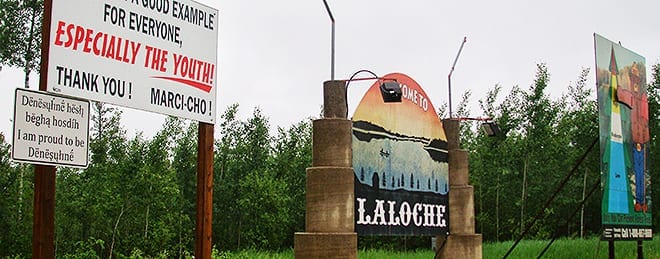Our responsibilities to La Loche

Author: mac brock – contributor
I have no doubts that you have already been overwhelmed in the cacophony of reports on La Loche Dene High School and its victims. I do not aim to discuss the course of events. Rather, my focus is the lens through which we perceive similar tragedies and what the responsibilities of our media, society and individuals must be in order to heal and improve.
My interest in the topic piqued from an interview conducted by Andrew Nichols of CBC News Now with cousin of one of the deceased, Patrick Wagenaar. Wagenaar, whose voice shook and broke throughout the phone conversation, struggled to explain his emotional state. One of Nichols’ early statements captured my attention:
“You sound… obviously, very upset about this,” the anchor stated, reveling in the painfully obvious. “This must just be awful.”
Silence followed, as Wagenaar waited for Nichols’ question. It never came.
“It’s still… uh… well,” Wagenaar fumbled over his words, “It’s still sinkin’ in.”
Nichols stammered over his line of questioning, unsure of how to approach the heartbroken family member. They stumbled over some more details before Nichols continues:
“The thing about… trying to make sense of all this. And you think about some of the… the things that you’ve heard about how this happened. What have you been hearing?”
Listening to Wagenaar recount the details was uncomfortable, yet I was compelled by the report. We hear countless stories of shootings and massacres from our southern neighbors, but don’t imagine it close to home. As Canadians, we hold ourselves to a high standard of peace, multiculturalism, and tolerance.
This interview was a small excerpt within hours of coverage, focusing primarily on the chain of events, its victims, and its perpetrator. It serves as a striking example of what drives hundreds of thousands of viewers to major news networks during times of crisis. On a basic level, we direct our attention at the intimate details of tragedy before allowing ourselves to zoom out and view the social and psychological conditions contributing to continued violence.
We are lucky to live (mostly) outside of the continual gun control debate raging strong in the United States. Canada’s strict gun control policy is a major component of the fact that Canada has seen fewer than tej school shootings since the year 2000 – while the United States has seen over 160 since the year 2013. As a result, instead of enduring an argument over whether hundreds of unchecked gun owners are safer than few licensed gun owners, we endure conversations like Nichols held on CBC: speculation that is devoid of fact over the emotional aftermath of violence.
The town of La Loche has a harrowing and shocking past. The events of January 22nd were not isolated; they were an installment in a decades-long saga of tragedy plaguing the largely Dene population. Between August 2005 and January 2010, 18 La Loche residents took their own lives – nearly one per cent of the town’s population of 2600. A pattern of rural isolation, cultural degradation, and stigma around mental illness bred tragedy, and it is now our responsibility to respond and take action.
The remnants of colonization haunt the prairie town with some of the lowest employment rates and highest addiction rates nationwide. Consistent neglect of treaty promises and the long-lasting effects of residential schools have diluted the once-strong Dene culture of the town, trapping it in cyclical poverty and violence.
The community is low not only in employment and educational resources, but more dangerously in mental health care. La Loche employs one psychiatrist, who visits only once every few months from Ottawa. Their mental health facility goes widely unused – in a small community, word travels fast about those who visit. Deep-rooted stigma relating mental illness to weakness or vulnerability has rendered self-inflicted violence among the only acceptable options for those who suffer in La Loche.
We have a responsibility to those who are suffering in the small town. Our media must be held accountable for their reporting, and their role in illuminating tragedy. Shootings are not, and can never be, tabloid-style catharsis. Exploiting heartbreak like that of Patrick Wagenaar to build ratings for news networks does not help us heal, it dramatizes violence and further stigmatizes mental health care.
The story of La Loche Dene Community High School is not an isolated incident. We imagine that it will never happen this close to home, yet we do not acknowledge that it is happening all around us. It is our responsibility to reach out and provide options from those who see only one option.
We owe it to Patrick Wagenaar, to La Loche, and to those around us who battle their demons every day.









